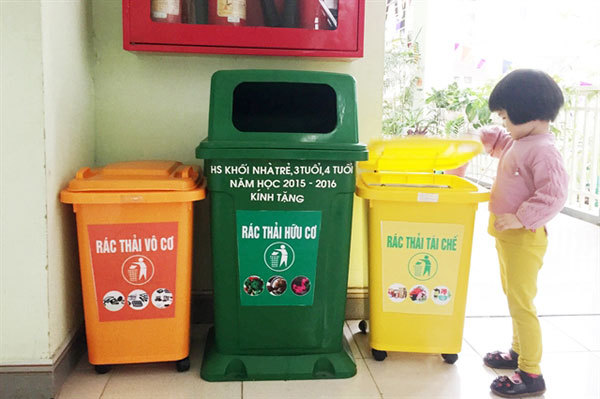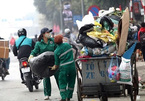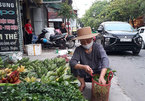 |
|
A little girl in Hoa Hong Kindergarten in Ha Long City, Quang Ninh Province is told to throw waste into right bin. — Photo baoquangninh.com
|
According to the NA Committee for Sciences, Technology and Environment, the agency responsible for examining the bill, thanks to feedback from NA deputies, the principle is now explained in the Article 4 of the bill.
“Environmental protection must be based on using resources efficiently, reducing waste, strengthening waste recycling and reusing in order to optimise the waste’s values," the article reads.
Phan Xuan Dung, head of the committee, told the NA Standing Committee meeting on Wednesday that the clarification aimed to prevent individuals or organisations from taking advantage of loosely defined terms to break rules in waste collection and treatment.
Regarding daily solid waste management, NA deputies asked for regulations to tighten waste classification at source and review spending on waste collection, transfer and treatment.
As an old version of the bill mentioned volume-based waste collection fees, NA deputies asked for a detailed roadmap to apply the new method to count fees that waste producers have to pay.
Currently, people pay the same amount of waste collection and treatment fee regardless of how much or what kind of waste they discharge.
“Managing daily solid waste discharged by households/individuals including collection, transport and treatment is a pending problem for almost all urban and rural areas in Vietnam,” Dung said.
Regulations on waste classification at source and fees based on the volume and type of waste aimed to promote waste classification and equality among waste producers, Dung said, explaining that the more waste people discharge, the more money they would have to pay for the waste to be collected, moved and treated.
Lessons learnt from other countries showed a period of time was required for such regulations to be implemented and become stable, Dung said, adding that a roadmap for the implementation was needed to match the different situations of localities.
Under the bill, waste would be classified into three categories – recyclable waste, food waste and others. The Ministry of Natural Resources and Environment would be responsible for issuing technical instructions on solid waste classification, counting fees for waste collection, transport and treatment based on the weight of waste and types of waste.
Meanwhile, people’s committees at the provincial level would decide the classification of other types of waste besides recyclable waste and food waste. They would also decide on State funding for waste collection/transport and treatment and fees that households and individuals have to pay.
The decisions must be made and publicised by the beginning of 2025.
According to the bill, if households and individuals classify waste at source, they would not have to pay fees for their recyclable waste.
If they don’t classify or incorrectly classify, they would have to pay fees for all the waste they generate including recyclable waste, food waste and other types of waste.
NA General Secretary Nguyen Hanh Phuc disagreed with the bill and said he thought instead of paying fees for waste to be collected, moved and treated, people should sell the waste to waste-collecting companies.
“If so, people would be more interested in classifying waste at home,” he said, adding that Government should offer support to companies like tax incentives.
Deputy Chairman of National Assembly Uong Chu Lưu said collecting such fees would be new in Vietnam so it would need a proper mechanism to implement.
Households could sell their recyclable waste but if they produce much daily solid waste, they had to pay more, Luu said.
“If people don’t have to pay for the waste they produce, they tend to produce more waste,” he said.
The revised Environmental Protection bill is expected to be discussed in the National Assembly’s agenda in October.
In the afternoon, the NA Standing Committee gave their opinions on the strategy to develop State Audit until 2030 before wrapping up the final working day of their 47th session. VNS

‘Pay as you throw away’ could solve waste problems
It's common in Vietnam to see people throw garbage on a dumping area by the pavement, then collectors come to load the waste into garbage carts and transport to treatment areas.

Simple daily change, green actions help environmental protection in Vietnam
Carrying a reusable shopping bag and a reusable plastic box to go to the market has become a habit for Hoang Thanh Hien, a 37-year-old woman, who lives in Linh Nam Ward, Hanoi's Hoang Mai District.